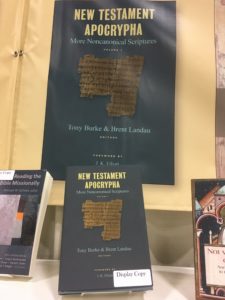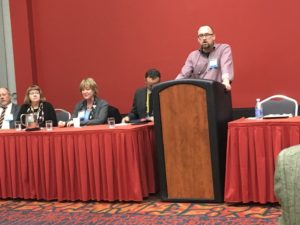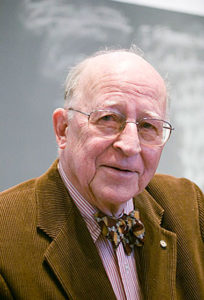2016 SBL Diary: Days One and Two
Looking back at my other SBL diary entries over the years, I see they usually begin with an apology about posting so late (the meeting concluded over a week ago). Well, at least I’m consistent. Some bloggers, like the prolific James McGrath, are far more swift than I (I think he posts about his own presentations while he is presenting). But what I lack in speed I (hopefully) make up for in depth. Here goes…
I arrived at San Antonio Friday evening at around 9 pm. That wouldn’t be so bad, except that I was supposed to hosting a reception at 8. Brent Landau, my co-editor for New Testament Apocrypha: More Noncanonical Scriptures, and I wanted to have a little party to celebrate the launch of the book and to thank our contributors. Thankfully Brent arrived by car from Austin and was able to get everything ready in my absence. After chugging a few plastic cups of “two-buck chuck” from Trader Joes and a few slices of meat, I gave a short thank you speech and then spent much of the next two hours listening to my American colleagues vent about their future president. That was the theme of the weekend for many of us, it seems.

I typically spend most of my SBL time either in meetings and receptions or at Christian Apocrypha sessions; there is little time to attend other sessions, even those featuring CA-related papers (and there were plenty of them this year). Saturday began with a video interview to promote MNTA vol. 1. Eerdmans prepared a bunch of these over the weekend. It was relatively painless—Brent and I sat across from one another in front of a green screen and answered some questions about the book. Brent is far more seasoned at this than I, so I expect the finished product will be mostly his answers and some cut-aways to me nodding my head and sipping from my Starbucks cup. I worry too what they will end up substituting for those green screens (it better not be that Star Wars kid).
After the filming, I did a quick run through the book exhibit, mostly to see MNTA on display. As it happens, they had only a “display copy” available. So, apologizing for being a pest, I asked them to place a stack on the table. Hell, if it was up to me there would be balloons and dancers. Books don’t sell themselves, y’know? I also popped by Gorgias Press and dropped off a draft of my forthcoming edition of the Syriac Infancy Gospel of Thomas, now four years late! Acquisitions Editor Melonie Schmierer-Lee seemed very pleased to see it. Speaking of Infancy Thomas, my second meeting of the day was a conversation over tea with Rob Cousland from the University of British Columbia. Rob is working on a book on the text and wanted to meet me and discuss the project. It’s good to know what people are doing with the text and always flattering to be consulted.
I finally made it to a session at 4 pm: a memorial for Helmut Koester. The late Harvard professor has been immensely influential, particularly on North American scholarship in the field. Though I never had the opportunity to meet Koester, his Ancient Christian Gospels was formative for my views on Christian Apocrypha. The panel was chaired by Brent Landau and featured Melissa Harl Sellew (University of Minnesota-Twin Cities), Christine Thomas (University of California-Santa Barbara), Christoph Markschies (Humboldt-Universität zu Berlin – Humboldt University of Berlin), Stephen Patterson (Willamette University), Cavan Concannon (University of Southern California), and Robyn Walsh (University of Miami). Ann Graham Brock (Iliff School of Theology) was scheduled to appear also but due to sickness, her remarks were read by Deborah Saxon.

Sellew began the session with an overview of Koester’s work on several apocryphal texts: Secret Mark, the Dialogue of the Savior, and the Gospel of Thomas. Koester was known for refusing to privilege canonical texts over noncanonical and sought to illustrate with these texts how both texts from both categories grew out of earlier, common traditions (e.g., the Gospel of Thomas and the Gospel of John reflect a conflict between two groups, with their shared ideas influencing the final forms of both texts). Sellew mentioned also that Koester believed the search for the Historical Jesus was a waste of time, though she noted several places in Koester’s scholarship where he seemed to be unable to resist speculation.
Christine Thomas followed Sellew with some interesting history of the Christian Apocrypha section, which was begun 25 years ago by Dennis MacDonald. For the first several years it was a seminar and achieved permanent status in 1997. Koester’s students frequently participated. Many of the early proposal submissions to the section indicated that some scholars were confused about what constituted “apocrypha”—papers on such texts as Sirach and Tobit were returned with an email stating “Wrong apocrypha. Sorry.” In the discussion after the presentations, Stephen Patterson mentioned a 1972 coup d’état of the SBL led by Koester. At first the group was a small, exclusive gathering of scholars; but Koester and others took control and opened up the membership. In one year SBL thus grew from 200 to 3000 participants. Thomas concluded with some remarks about Koester’s doctoral students. Surprisingly, only seven of the dissertations supervised by Koester focused exclusively on apocryphal texts. There seems to have been some concern among his students that writing on apocrypha would affect their job opportunities. Most often, Koester’s students, like their teacher, would write on both canonical and noncanonical texts; indeed, Thomas said, “under Koester no-one ever studying the New Testament actually wrote about it.”
Christoph Markschies focused his comments on Koester’s German roots. Koester was Rudolph Bultmann’s final doctoral student and Koester’s interest in form criticism is indebted to his teacher. For more on Koester’s background, Markschies recommended reading Brent Landau’s essay, “The ‘Harvard School’ of the Christian Apocrypha” published in the 2013 York Christian Apocrypha Symposium Papers (shout-out to YCAS!). Markschies mentioned also his own interactions with Koester, whom he met at his first SBL in 1995 at a plenary organized by James Robinson for the fifty-year anniversary of the discovery of the Nag Hammadi library. Markschies commented that Koester was critical of Robinson’s negative comments about European scholars.

Both Koester and Robinson were influential for the next speaker on the panel: Stephen Patterson. He studied with Robinson, and Koester was a reader of his thesis. Patterson praised Koester’s seminal works “One Jesus and Four Primitive Gospels” and “GNOMAI DIAPHORAI: The Origin and Nature of Diversification in the History of Early Christianity.” Patterson said, “Take any paragraph from these two papers, add water and you have an instant dissertation—that’s what I did.”
The remaining presenters, like Patterson, were all students of Koester and praised their teacher for his guidance and affability. Ann Graham Brock (as read by Deborah Saxon), was introduced to Koester in an archeology course and then became his research assistant. From a conservative background, Brock was always told that apocryphal texts were heresy and she should do everything to avoid them. “I did,” she said, “until I met Helmut.” Brock called Koester “the Michelangelo of Mentors”: “he would look at us and say there must be a scholar in there somewhere.” Koester’s twin interests in literature and archeology were mentioned also by Concannon and Walsh. Concannon worked for Koester converting his extensive slides into electronic form; Walsh commented that Koester was prescient about the promises of Digital Humanities, as well as other topics currently in discussion. The two youngest members of the panel shared jokes and stories about their mentor but also confessed some unease about Koester’s background in Nazi Germany—he was a soldier and a POW. Overall the session was a fitting tribute to Koester’s work. I hope that someone, either in North America or Europe (if not both), will take up the task of assembling a volume of papers demonstrating his continued influence on our field.
After the session, my wife Laura and I joined Brent Landau and Janet Spittler for a sea food dinner on the Riverwalk. The conversation once again drifted to the US election results, but we also chatted about work, travel, and things apocryphal. The day came to a close with a cameo at the reception for the Toronto School of Theology.
To be continued…
